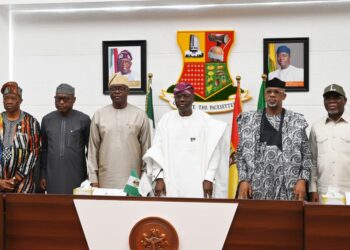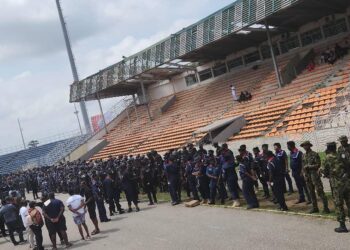


Fresh allegations have emerged from within the Nigerian Army’s 90 Battalion, Koko, Warri, Delta State, as several soldiers claim that welfare failures, administrative breaches, and integrity issues within the unit remain unresolved, despite a recent official disclaimer dismissing previous reports.
The soldiers, who spoke to SaharaReporters on condition of anonymity due to fear of reprisals, insist that conditions inside the battalion have “deteriorated to an alarming degree.”
Their accounts portray a unit grappling with internal power struggles, welfare neglect, and alleged financial exploitation.

According to multiple soldiers, the structural and disciplinary framework of the battalion has weakened significantly. They accuse two senior non-commissioned officers identified as Sgt Babangida Galadima (2000NA/49/466) and Sgt Abdulmalik Musa (2003NA/54/5259), of exercising “disproportionate and undue influence” within the unit.
“These two sergeants have more power than officers. Even the Finance Officer and newly posted Chief Clerk were sidelined,” one soldier alleged.
Another soldier who confirmed the claim said the influence of the NCOs “extends far beyond their rank,” adding, “Everyone knows who really calls the shots. Officers are careful around them because of the system that has been built over time.”
Alleged Diversion of Welfare Supplies and Administrative Irregularities
Several personnel also alleged that welfare materials meant for rank-and-file soldiers, including basic supplies like bottled water, were diverted.
“We’re in the riverine area, yet we’re struggling to get drinking water. Even getting approval to go on pass is a problem because the gunboats are not available,” a soldier told our correspondent.
Others described administrative confusion following postings, with claims that a Master Warrant Officer newly appointed as Chief Clerk received no formal handover, contrary to military procedure.
“It’s like the battalion operates on its own rules. Proper handovers don’t happen because the structure has collapsed,” an internal source claimed.
Perhaps the most troubling claims involve alleged religious favoritism in the assignment of soldiers to lucrative checkpoint duties.
According to several personnel, Muslim soldiers were repeatedly posted to the battalion’s major revenue-prone checkpoints, such as “Amukpe, Jesse, Oton and Koko.”
Several soldiers allege that these postings came with an unofficial weekly return of ₦200,000, allegedly remitted to the two senior NCOs previously mentioned.
“Everybody knows the checkpoints bring money. But the postings were not based on rotation or merit, just religion and loyalty,” one soldier claimed.
None of these allegations have been independently verified, and the Army has not responded to the specific claims of religious bias.
However, after SaharaReporters recently reported public outcry, the battalion reportedly carried out a sudden rotation of troops on Saturday, November 22. Soldiers interpret the timing as suspicious.
“It wasn’t routine. It was clearly to scatter people and relocate those who know too much,” one junior rating alleged.
Another added: “An investigation was claimed to have been done in 24 hours. How do you investigate welfare abuse, religion-based postings, and financial returns in one day?”
Questions Raised Over ₦7 Million Monthly “Assistance” Claim
The battalion’s earlier rebuttal claimed that the Commanding Officer, Lt Col M. M. Garba, “assists soldiers with ₦7 million monthly”, a statement that further fueled skepticism among troops.
“Where does such money come from? Is it from Army Headquarters? A donor? Or personal income?” a soldier asked.
“If ₦7 million enters this battalion monthly, we deserve to know how it’s spent.”
Troops also questioned the accuracy of the service numbers attributed to the two senior NCOs, calling them “irregular” in deployment documents.
90 Battalion, situated in Koko, Delta State, operates in a sensitive revenue and security corridor, manning waterways, checkpoints, and creeks known for illegal oil bunkering, smuggling, and other economic crimes.
Multiple former personnel say these operational realities have historically made the battalion vulnerable to internal corruption networks.
A retired soldier who served in the unit for four years said: “Whenever you see unusual power concentrated in the hands of sergeants, check the environment. Koko axis has been problematic for a long time.”
Another former operative, Abudu Akinlola Olumayowa, who publicly supports the calls for accountability, added: “I once carried guns and explosives for Nigeria; today I carry the pen. If the Army doesn’t correct these failures, the morale of soldiers will continue to sink.”
Calls for an Independent Probe
The concerned soldiers insist they want neither chaos nor public confrontation. According to them all they want is accountability.
“We are not attacking the Nigerian Army. We are asking for fairness, welfare, and transparency,” one soldier emphasized.
“Only a neutral, independent investigation can clean this mess.”
The soldiers said they are willing to testify before any independent investigative panel, provided they are protected from reprisals.
Efforts by This newspaper to reach the Director of Army Public Relations, Lieutenant Colonel Anele Onyinyechi Appolonia, were unsuccessful, as she neither answered her calls nor responded to a text message seeking her reaction.










